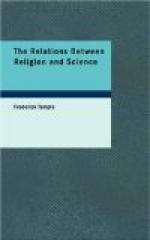But in the third place, the result of this clinging to externals is to shut out Science and all its correlative branches of knowledge from their proper office of making perpetually clearer the true and full meaning of the Revelation itself. It is intended that Religion should use the aid of Science in clearing her own conceptions. It is intended that as men advance in knowledge of God’s works and in power of handling that knowledge, they should find themselves better able to interpret the message which they have received from their Father in Heaven. Our knowledge of the true meaning of the Bible has gained, and it was intended that it should gain, by the increase of other knowledge. Science makes clearer than anything else could have made it the higher level on which the Bible puts what is spiritual over what is material. I do not hesitate to ascribe to Science a clearer knowledge of the true interpretation of the first chapter of Genesis, and to scientific history a truer knowledge of the great historical prophets. The advance of secular studies, as they are called, clears up much in the Psalms, and much in the other poetical Books of Scripture. I cannot doubt that this was intended from the beginning, and that as Science has already done genuine service to Religion in this way, so will it do still better service with process of time.
On this side also, as on the scientific side, the teaching of the spiritual faculty and the teaching of Revelation indicate that the physical and the spiritual worlds are one whole, and that neither is complete without the other. Science enters into Religion, and is its counterpart, and has its share to take in the conduct of life and in the formation of opinion. And the believer is bound to recognise its value and make use of its services.
In conclusion, it is plain that the antagonism between Science and Religion arises much more from a difference of spirit and temper in the students of each than from any inherent opposition between the two. The man of Science is inclined to shut out from consideration a whole body of evidence, the moral and spiritual; the believer is inclined to shut out the physical. And each, from long looking at that evidence alone which properly belongs to his own subject, is inclined to hold the other cheap, and to charge on those who adduce it either blindness of understanding or wilful refusal to accept the truth. And when such a conflict arises it is the higher and not the lower, it is Faith and not Science that is likely to suffer. For the physical evidence is tangible, and the perception of it not much affected by the character of the man who studies it; the spiritual evidence stands unshaken in itself, but it is hid from eyes that have no spiritual perception, and that perception necessarily varies with the man.




